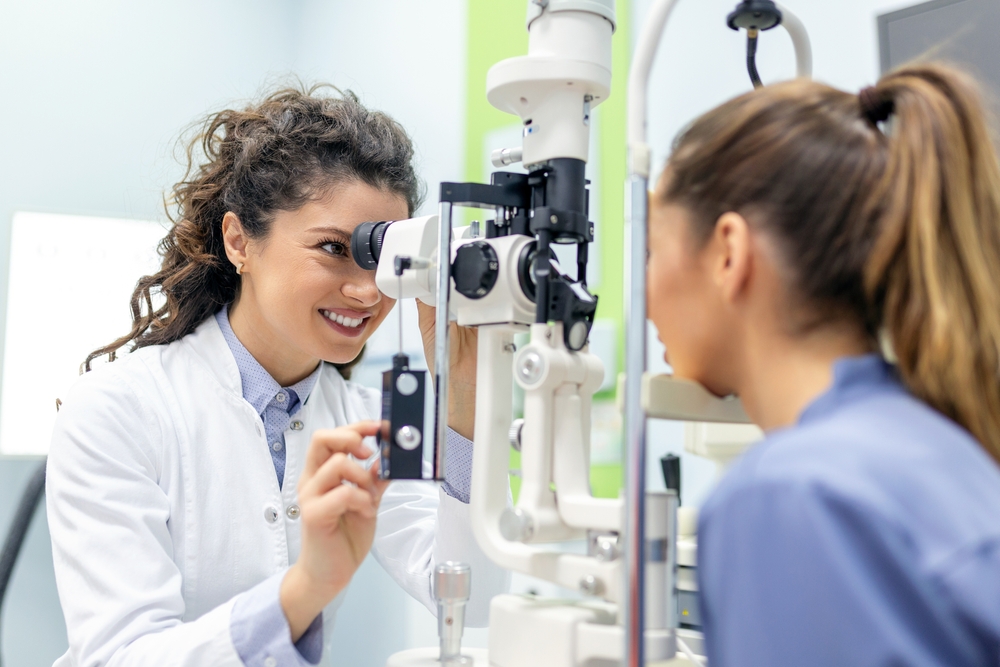If you are ready to say goodbye to the hassles of glasses and contact lenses, you might benefit from a vision correction procedure. Today, with many different modern vision correction procedures available, more people than ever are finally enjoying visual freedom.
However, undergoing a comprehensive evaluation with an ophthalmologist before your procedure is essential. Keep reading to learn more about why you need an eye exam before undergoing a vision correction procedure.
What Are Vision Correction Procedures?
Vision correction procedures can improve your vision by reshaping the cornea or replacing the natural lens of the eye to correct refractive errors and reduce or eliminate the need for visual aids. LASIK, PRK, SMILE, EVO ICL, and RLE are the most well-known procedures:

LASIK
LASIK is a vision correction procedure that uses lasers to correct nearsightedness, farsightedness, and astigmatism. During LASIK, a flap is made on the cornea’s surface with a femtosecond laser.
The flap is then folded back, and the underlying corneal tissue is reshaped with an excimer laser before placing the flap back over the eye. This allows light to refract off the cornea into the retina at the optimal point for clear vision.
PRK
PRK can also correct nearsightedness, farsightedness, and astigmatism. It is often recommended as a LASIK alternative for patients whose cornea is too thin to safely create a flap.
In the PRK procedure, the outer layer of the cornea, the epithelium, is entirely removed to access the cornea. Like LASIK, vision is then corrected by reshaping the cornea with an excimer laser.
SMILE
One of the latest vision-correction procedures, SMILE, uses a femtosecond laser to create and remove a disk of corneal tissue called a lenticule. The lenticule reshapes the cornea, correcting nearsightedness and astigmatism.
This procedure is considered less invasive than previous vision correction procedures because it disturbs fewer corneal nerves, which allows for a faster recovery and reduced risk of side effects like dry eyes. However, farsightedness cannot be corrected, as with LASIK and PRK.
EVO ICL
EVO ICL is another modern vision correction procedure that can correct nearsightedness and astigmatism but not farsightedness. This procedure involves implanting a thin, flexible lens between the iris and the natural lens of the eye.
Your ophthalmologist can remove the lens if needed, making EVO ICL the only reversible vision correction procedure. This procedure is an excellent LASIK alternative for patients with severe nearsightedness, as it can correct up to -20.00 diopters.
Refractive Lens Exchange (RLE)
During RLE, the natural lens of the eye is removed and replaced with an artificial intraocular lens (IOL) that corrects vision. Depending on the IOL used in the procedure, it can offer improved vision at multiple distances and correct nearsightedness, farsightedness, astigmatism, and presbyopia.
This procedure is often recommended for adults older than 40 who want to both correct their vision and prevent cataracts from forming in the future. RLE uniquely protects you against cataracts because it requires removing the natural lens, the structure in the eye on which cataracts develop.
Why Do I Need an Eye Exam Before a Vision Correction Procedure?

An eye exam and consultation are essential before any vision correction procedure. It allows your ophthalmologist to evaluate the health of your eyes, determine your candidacy, and effectively plan for the procedure you are considering.
A vision correction consultation assesses various aspects of your eyes, vision, lifestyle, and health to ensure the safety of your chosen procedure and its possible outcome. These aspects include:
Prescription
Measuring visual acuity and establishing a patient’s prescription help determine the degree of a patient’s refractive error. Your prescription plays a large part in deciding which procedure is right for you.
While many people are suitable candidates for LASIK, if you have severe nearsightedness, you may be better suited for EVO ICL, and if you have presbyopia, your eye doctor may recommend RLE.
Corneal Thickness
The thickness of your corneas is one of the key factors in determining your candidacy for LASIK. The procedure requires sufficiently thick corneas to safely create the corneal flap.
Corneal thickness is less of an issue than other procedures like PRK, SMILE, EVO ICL, and RLE, making them good alternatives for patients with thin corneas.
Corneal Surface and Pupil Size
Mapping the shape and surface of the cornea is pivotal to the outcome of procedures that correct vision by reshaping the cornea. If not accounted for, surface irregularities can compromise the results.
Larger pupils can increase the likelihood of visual disturbances, such as halos, glare, and starbursts, after certain procedures. Measuring pupil size ensures that eye surgeons and ophthalmologists recommend procedures with minimal side effects and the best outcomes.
Eye Health
Healthy eyes are a prerequisite for most vision correction procedures. Underlying eye conditions, like cataracts, glaucoma, or retinal issues, can complicate recovery and affect outcomes.
If you have untreated dry eye, LASIK can worsen the condition, threatening the overall health of your eyes. Your ophthalmologist may recommend another procedure, like EVO ICL, PRK, RLE, or SMILE, which interferes with fewer corneal nerves.
Overall Health
Your overall health is another important aspect in determining your candidacy for a vision correction procedure. Some chronic health conditions, like diabetes or autoimmune disorders, can affect recovery and significantly increase your risk of complications.
Age and Stability of Prescription

Hormonal changes during puberty have the potential to cause prescription changes, which is why you must be at least 18 to undergo LASIK, PRK, or RLE, 21 for EVO ICL, and 22 for SMILE. Your prescription must be stable for one year or more before your procedure.
Hormonal changes during pregnancy can similarly affect your vision, so you must wait until you are no longer pregnant or breastfeeding to get a vision correction procedure.
Your eye doctor at Cheema MD Eye Care will consider all these factors when helping you make an informed decision about which vision correction procedure is best for you. Schedule an appointment at Cheema MD Eye Care in Kingston, NY, today to discover whether you’re a vision correction candidate!



